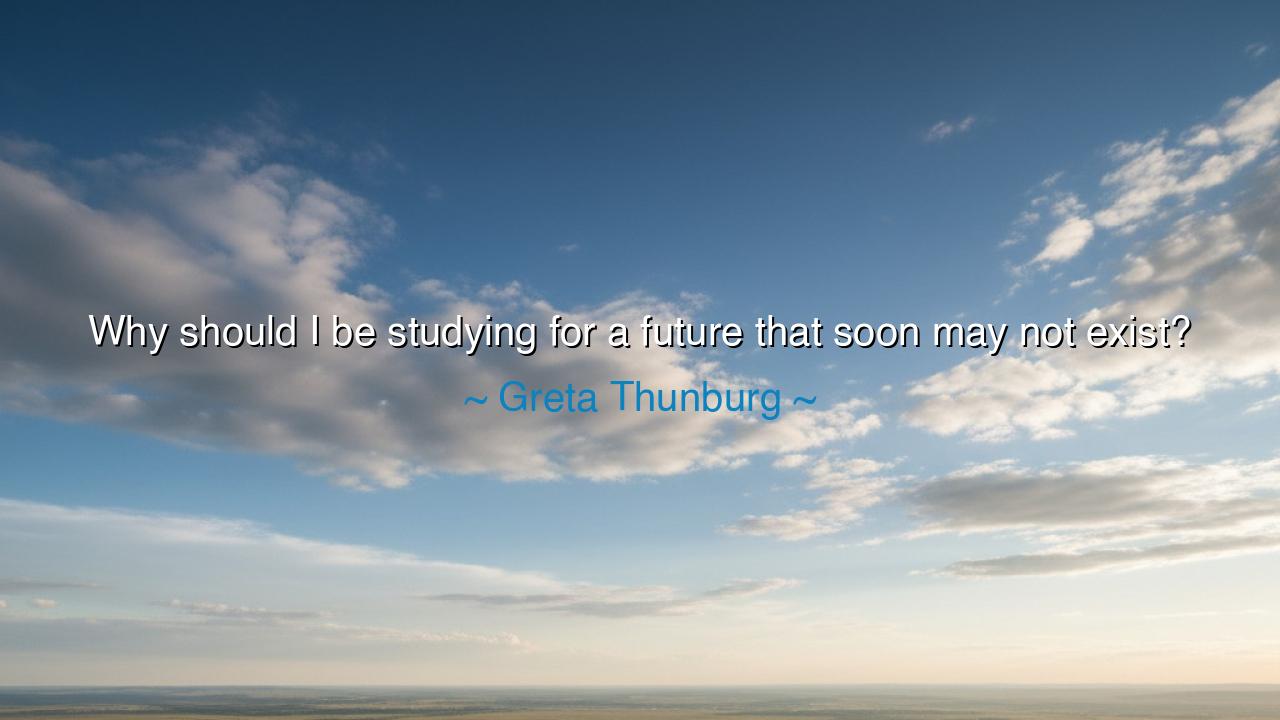
Why should I be studying for a future that soon may not exist?






Greta Thunberg’s words strike with the force of a battle cry: “Why should I be studying for a future that soon may not exist?” In her voice, we hear not just the frustration of youth, but the anguish of a generation standing on the precipice of environmental collapse. Her statement challenges not only the systems that have failed the planet but also the very notion of hope and progress in a world teetering on the brink of destruction. It is a question that reverberates through time, calling us to examine not just the state of the earth, but the responsibility we bear for its future.
The origin of this quote is grounded in the most urgent of modern crises: the climate emergency. Greta, a young woman raised in a world marked by environmental degradation, speaks with the wisdom of the ancients, whose voices have always sounded alarms when the natural world was in peril. Just as the Greek philosophers warned of the imbalance between humanity and nature, so too does Greta question the value of education in a world that may soon be ravaged by unchecked greed, unsustainable practices, and relentless exploitation. Her words invoke the ancient struggle between man and nature, reminding us of the consequences of arrogance when humans fail to respect the earth that sustains them.
The question Greta poses cuts through the veil of complacency: “Why should I be studying for a future that soon may not exist?” This is not a call to despair, but a call to action. It is an invitation to confront the uncomfortable truth that our actions today may rob future generations of the very world they are supposed to inherit. In ancient times, King Midas was cursed by his greed, turning everything he touched into gold, only to find himself unable to touch the joys of life. Similarly, humanity’s greed and short-sightedness have turned the Earth into a prison of our own making, leaving future generations with a dwindling supply of the resources and beauty that once sustained us. Greta’s words are a modern echo of the ancient warnings against excessive consumption, excess, and neglect.
Consider the story of Noah—a man who, upon seeing the corruption and decadence of his age, chose to act, even when others laughed at him. He saw the end of his world and responded not with fear, but with purpose. He built the ark, not just for himself, but for all those who could be saved. In the face of overwhelming disaster, he embraced the role of a protector and a guardian of life. In contrast, our own era is filled with inaction—leaders who ignore the warning signs of environmental collapse, while young voices like Greta’s cry out for change. Greta, like Noah, sees a world heading toward ruin, but unlike the generations before her, she demands answers and change.
The deeper lesson in Greta’s question is that we must no longer ask, “What can we gain from the future?” but instead ask, “What will we leave for future generations?” In the ancient world, the wisdom of elders was passed down not just through books and teachings, but through action—through the lives they lived and the legacies they left. The ancient Egyptians built their pyramids not just as tombs, but as symbols of their understanding of time, continuity, and the eternal importance of protecting the earth. In the same way, our legacy will not be defined by what we acquire, but by what we leave behind for those who come after us.
Greta’s words remind us that the future is not guaranteed—it is something we must create. Our ancestors understood this principle; they worked not for their own immediate comfort, but for the survival of their people. They planted trees knowing they would never see them grow, they built structures knowing their descendants would inherit them. Today, we must embrace this same sacrifice, understanding that today's actions will shape the world of tomorrow. We cannot afford to simply prepare for a future that may never come; we must act now to secure that future.
The practical lesson from Greta’s words is clear: we must take responsibility for the world we are leaving behind. We must live consciously, ensuring that our choices are sustainable, that we no longer exploit the earth for short-term gain. In our daily lives, we can reduce waste, support renewable energy, and advocate for policies that protect the environment. We must also educate the next generation not just to survive, but to thrive in harmony with nature. Just as the ancient sages passed down wisdom to protect future generations, so too must we rise to this challenge. The future is not something we wait for—it is something we build, one choice at a time.
In the end, the lesson is simple: act now, for the future is not a distant abstraction—it is a reality we are shaping with every decision. Let us live as guardians of the earth, not for ourselves, but for those who will come after us. The time to prepare for the future is today, and only through bold, decisive action can we ensure that the world Greta speaks of—one filled with hope and opportunity—will exist for generations to come.






AAdministratorAdministrator
Welcome, honored guests. Please leave a comment, we will respond soon